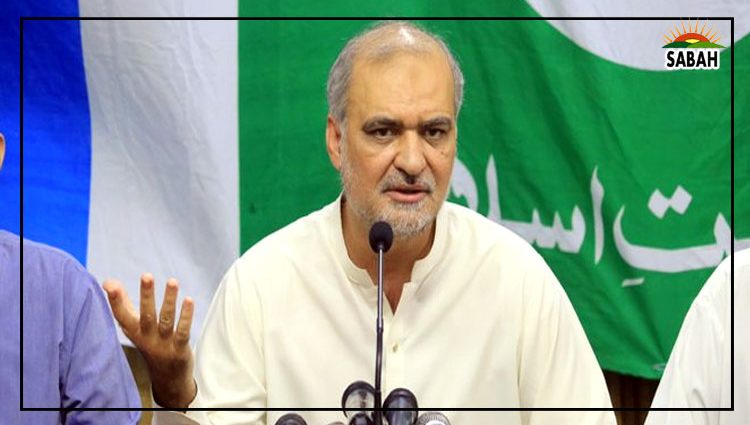Hafiz Naeem ur Rehman Demands Full Court for Petition Against 26th Constitutional Amendment
He criticized Nawaz Sharif for advising his daughter to buy PIA to run it under Punjab
KARACHI ( WEB NEWS )
Hafiz Naeem ur Rehman, Amir of Jamaat-e-Islami Pakistan, has called for the Supreme Court to hear the petition against the 26th constitutional amendment with a full court bench and to broadcast the proceedings live, as has been done in the past. He stated that the assembly formed on the basis of Form 47 does not have the authority to dismantle the foundational structure of the 1973 consensus constitution. He criticized the 26th amendment for undermining the judiciary and attacking the constitution and democratic freedoms, asserting that this amendment should be revoked. Jamaat-e-Islami will robustly and genuinely represent the nation’s interests.
He expressed concern over the privatization of Pakistan International Airlines (PIA), describing it as a significant question mark and called for an end to the mockery of the nation. He criticized Nawaz Sharif for advising his daughter to buy PIA to run it under Punjab, and noted that Ali Amin Gandapur is also discussing operating PIA under Khyber Pakhtunkhwa. He questioned who is responsible for PIA’s decline over the past 40 years and highlighted that the Pakistan Tehreek-e-Insaf (PTI) had claimed it would manage national institutions effectively. He demanded that Gandapur explain why PTI failed to improve PIA during its tenure.
Hafiz Naeem ur Rehman also criticized the maintenance costs for the planes of the President and Prime Minister, which have been approved at 1.75 billion rupees, and pointed out the enormous payments made to Independent Power Producers (IPPs) exceeding 200 billion rupees in a year for electricity that was neither produced nor consumed. He questioned why IPPs, of which the government owns 52%, are exempt from income tax. He criticized the dollar-based seven-year generation tariff given to K-Electric, calling it a worst-case scenario for an IPP.
During the press conference at Idara Noor Haq, he expressed that the issue of judicial appointments had already been settled based on seniority, emphasizing that the problem lies not in who is appointed but in the method of appointment, which he claimed allows the government to control the judiciary and politicize it. He alleged that some votes in the amendment were bought, suggesting that corruption has corrupted loyalties and any legislation resulting from such means is invalid.
He asserted that managing national institutions and ending their corruption is the government’s responsibility and rejected the idea of selling them off. He cited the sale of K-Electric shares at 1.65 rupees each, despite their value exceeding 10 rupees, and pointed out that the number of K-Electric consumers has increased from 1.8 million to 3.8 million while production units have decreased by 15 to 20 percent. He lamented that K-Electric has become a burden on the nation and questioned who will answer for this, stating that no other political party fights for the rights of Karachi’s citizens against K-Electric except Jamaat-e-Islami.
Hafiz Naeem ur Rehman further criticized the process of PIA’s privatization, stating that initially five or six parties showed interest, but eventually withdrew, leaving only one that offered 10 billion rupees, while PIA’s assets are valued at 152 billion rupees, with an additional 202 billion in royalties and receivables of 16 to 17 billion rupees. He pointed out that there are 7,100 permanent and 2,400 daily wage employees at PIA. He held the current rulers responsible for the destruction of Pakistan’s institutions, noting that Pakistan Steel was profitable in 2008 before it fell into loss and questioning why Nawaz Sharif had cut off its gas supply.
He reiterated that managing national institutions is the government’s responsibility and that the root cause of their failures is corruption among the rulers. He questioned what the government has done to alleviate the burden of IPPs, which have cost the nation over 200 billion rupees in a year. He criticized the privatization process of IPPs, where 52% is still government-owned, claiming that it leads to corruption and is detrimental to the Pakistani economy. He demanded accountability for those responsible for this decline.

